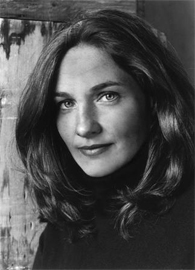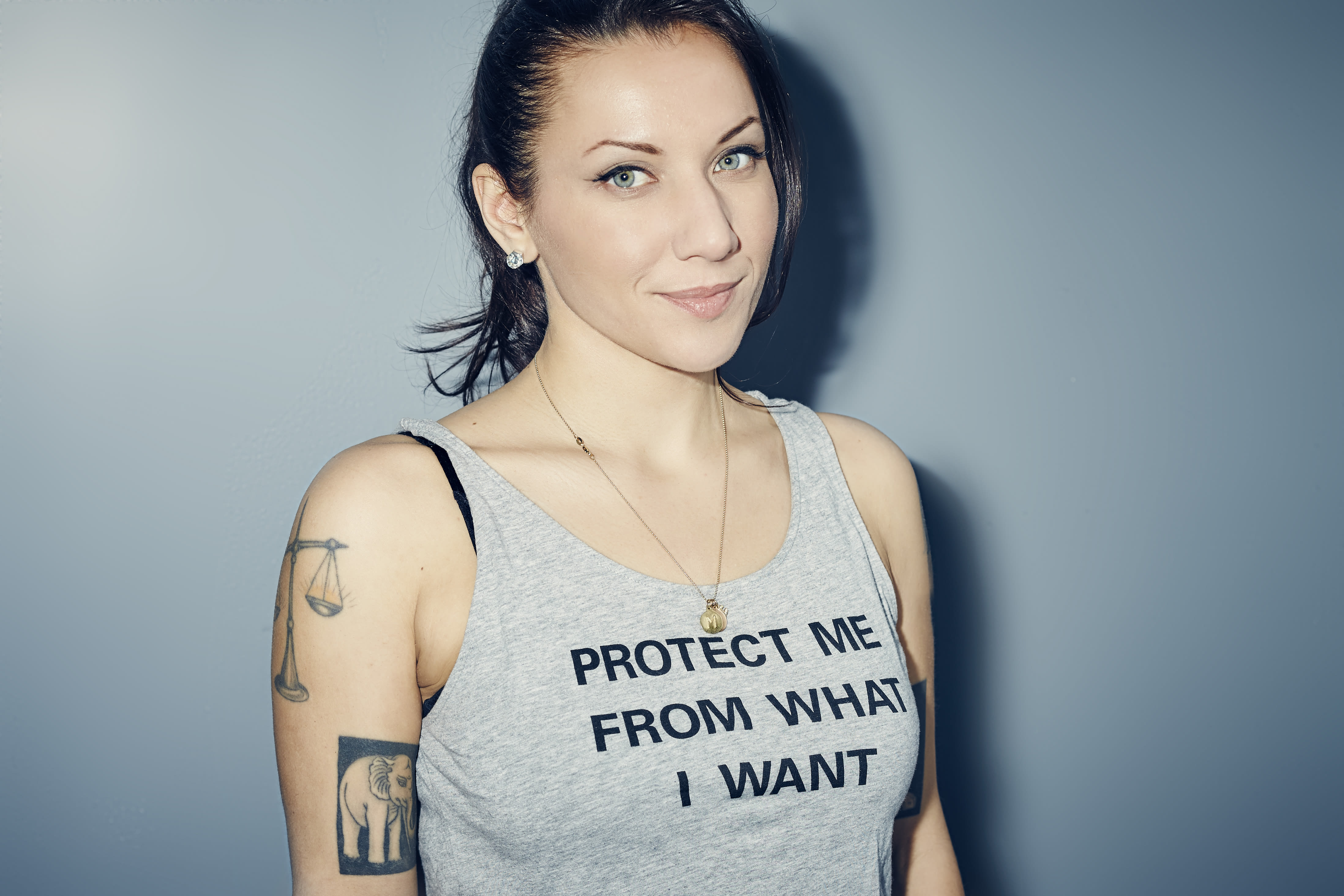Q&A: A.M. Homes

A.M. Homes is the shock jock of contemporary American literature.
Her acclaimed debut story collection The Safety of Objects (made into a 2001 movie) includes pieces about a teenage boy’s sexual experimentation with his sister’s Barbie and a suburban couple’s psychotropic experimentation with crack. In her novel The End of Alice, an incarcerated kid killer gives a younger female pedophile pointers on child sex abuse. And by the 15th page of her newest book, the novel May We Be Forgiven—which won this year’s Women’s Prize for Fiction (formerly the Orange Prize for Fiction)—a main character has already killed two people in a car crash and bludgeoned his wife to death with a lamp.
What separates Homes from Howard Stern, though, is this: though her excavations of the suburbs’ manicured landscape are disturbing, they are also substantive commentaries on postmodern America—and darkly funny ones, at that. In advance of Homes’s appearance at Wordstock later this week, we called the writer at her home in New York and talked about whether gender inequality in literature exists, what dick pics say about our sense of self, and why 9/11 made her writing more optimistic.
Culturephile: Have you been to Wordstock before?
A.M. Homes: I’ve not been to Wordstock, but I’ve been to Portland several times.
And what do you think of our fair city?
I like your fair city a lot. I’m a huge Powell’s fan. I’d like to just live in Powell’s—they should have a writer-in-residence program.
For your Wordstock reading, do you plan to read from May We Be Forgiven?
I’m doing a panel, and then I’m doing a reading, and then I’m doing the Live Wire! show, so I think at the 5 o’ clock reading I may mix it up a bit. [See below for event details.]
How so?
I don’t know yet. Backwards or something.
Which panel are you doing?
I am on a panel with Adam Mansbach and a bunch of people, “The Dark Side: Creating Suspense.”
That’s funny, given there’s no suspense whatsoever in your newest book. [The book’s most dramatic plot points take place in the first 15 pages.]
I created it early in that one. Create the suspense and then dispense with it.
As far as the Women’s Prize for Fiction goes, where do you come down on the issue of there being a separate award for women writers? Are you concerned it creates the impression female writers can’t be matched against their male counterparts?
No. The history of the prize is that it was started by a group of women, including a bunch of writers like Angela Carter, in response to how few women writers were included on the short list for the Booker Prize. I think there’s always been a peculiar kind of inequality in the number of reviews that books by men and books by women get. On the one hand, I would like to believe that that’s not true, and yet when one just looks at the numbers…If you look at the books that were the finalists for the Women’s Prize this year, it’s amazing if you look at the subject matter: there’s Barbara Kingsolver, and Hilary Mantel, and a lot of writers who certainly aren’t writing what we think of as women’s fiction or chick lit. And my book, which is about two angry brothers, one of whom murders his wife in the first pages, is certainly not what you would call a “woman’s book.”
But it is about family, and you sometimes hear the argument that the inequality you mentioned has to do with men writing sweeping books about, say, war and women writing about a different, more personal sphere.
I think that that’s sometimes the way literature is characterized. To some degree, you could say that this book is about family; it’s really about American society and culture. It is a big book about life in America. And I think to look at it any differently than you would look at other big books, like Franzen’s last book, would be…not smart. If you look at John Cheever in the same way, you could say, theoretically, Cheever writes small, domestic books, but I think they’re also very much about American culture and where we are at a particular point in time. So I don’t think the argument that men write the big books and women write the small, domestic ones is valid—but it is interesting.
Your last novel, This Book Will Save Your Life, was in part about connection and disconnection. That theme is also in May We Be Forgiven, where you write about how technologies that are supposed to connect us actually separate us. Why did you carry the idea over?
This Book Will Save Your Life was about a guy who had become so successful that he’d managed to isolate himself from the rest of the world, and it was about him having been functionally dead, trying to come back to life. The connectivity there was human connectivity, from the people that he meets. So it’s about connectivity, but also, really, our responsibilities to and for each other. It was the first book I wrote after 9/11, and it was very much about how we relate and don’t relate. The technological aspect of connectivity is very much in May We Be Forgiven because I was really aware of how our use of gadgets is quite actively changing how we relate. It’s changing how we date, going online to meet people. The idea that people would photograph their genitals and post them and think that’s attractive amazes me—and it’s everywhere. There’s genitals everywhere online! I was thinking today about, is there some fracture in our concept of self that we put ourselves out there in that way? In a way in which we allow ourselves to develop these avatar personalities that we are online? I think it’s fascinating both what you can do with technology and the ways in which it now has interrupted our humanity. Like many writers, I think that one works with certain themes and ideas until you kind of solve for x.
So you haven’t solved for x yet.
I’m working on it.
Aren’t we all. So, I thought the book [May We Be Forgiven] was hilarious, and a lot of the humor comes out of the absurdity of capitalism and commercialism, or technology, or, like, kids these days. Does the humor in the world as it is today just jump out at you?
I think we live in a world that is filled with so many mixed messages. There is an absurdity to everyday life. But I also think the social and fictional use of humor is to make it possible to talk about things that would otherwise be pretty hard to talk about. So, if you can make people laugh, that actually allows you to be, in some ways, more serious. And I did take a class in stand-up comedy while I was writing the book. I went to the Upright Citizens Brigade and studied stand-up because I thought, I just have to get out of the house occasionally, and wanted to try to do something that I thought would be hard to do.
How did it go? Are you a comic?
They kept insisting that I was thinking too hard, and I kept thinking, I’m not thinking at all! When I was on book tour, whenever I would mess up in my reading, I would weirdly break away and devolve into stand-up comedy, and people would just look at me like I was crazy.
May We Be Forgiven is a very optimistic book, and This Book Will Save Your Life was too. That’s in contrast to your early work, like The Safety of Objects, which was quite dark. Why do you think your writing has taken that direction?
I know exactly what it is. You know, I was home on 9/11, looking out my window, which faced the World Trade Center, and I saw the second plane hit and I saw the whole thing happen. It was a moment in time where, for the first time, what I saw in reality went beyond anything I might ever imagine. All of that sort of prompted me to think about, how do you write optimistically when you’re living in a time that’s not inherently optimistic? Some of the critics have looked at the last two books and said, “oh, she’s gone soft,” or “oh, she’s lost it,” and I think, you wouldn’t believe how much harder it is to write an optimistic book. Obviously, murder and families falling apart are not particularly hopeful moments, but it interests me in a very genuine way to try to organically find a way through it that leaves one with some sense of hope.
A.M. Homes
Oct 5 at 5
Convention Center
"The Dark Side: Creating Suspense" (panel)
Oct 5 at noon
Convention Center
Live Wire!
Alberta Rose Theater
Oct 5 at 6:30
For more info, visit Wordstock's website. What are you working on now?
I’m teaching and I’m writing a pilot for CBS. [Homes wrote for and produced the Showtime series The L Word.]
What can you tell me about that?
Nothing yet, because even CBS doesn’t know yet what it’s about. I have a contract with them to do a pilot, and I will be presenting them with what that is in the next couple days, actually, so I’m working on it like crazy.
Sounds fun.
Not really [laughs]. When you’re doing those kinds of things, it’s different than writing fiction, because you’re trying to figure out how to do it in a way that fits the structures of one-hour storytelling, and also fits the structures of what a particular network needs. It’s like some weird crossword puzzle.
For more Wordstock highlights, peruse our abridged schedule.




